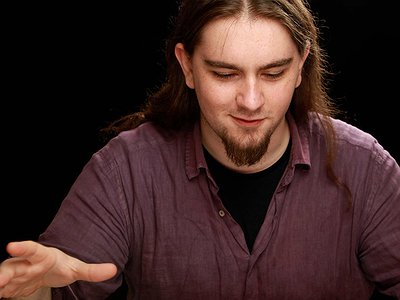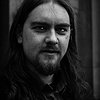How do you make use of technology? In terms of the feedback mechanism between technology and creativity, what do humans excel at, what do machines excel at?
I fully embrace technology in most areas of my work, though I won’t ever get a voice activated assistant. With all technology, you are working within someone else’s framework. A UI that makes sense to one person is totally unusable to another and that’s why I like to start with pen and paper. It is freeing to quickly sketch an idea in a few seconds that might take a few minutes on a computer but then once I know what I want, I make the technology do what I want it to.
Humans excel at new ideas and innovative thinking drawing from disparate sources. Machines are good at pattern-spotting, repetition and sticking within given rules. And when you are talking about art you definitely don’t want to be confined by someone else rules.
The accurate repetition technology affords is one of its greatest things. If it wasn’t for technology we wouldn’t have recording or be able to disseminate music as widely as we can from almost anywhere and anywhen. This wide dissemination means I can be influenced by music I couldn’t have heard otherwise. And the cycle continues.
On a more practical note, I really enjoy the sonic possibilities of live electronics. How you can use them to subtly extend the sound of a familiar instrument or totally change it. The possibilities technology gives us are limitless, but the hard part comes with creatively limiting yourself to make good work.
Collaborations can take on many forms. What role do they play in your approach and what are your preferred ways of engaging with other creatives, including the artists performing your work?
Collaborations can feel a bit like a conversation or a sharing of ideas. When working with musicians on a new piece I'd often come with something already written, we try it and discuss it. If something doesn’t work the player makes suggestions or shows me what they can do around that idea. There’s happy accidents where they play something ‘wrong’ but the ‘wrong’ sounds better than what I wrote so that makes it into the piece. This is true even when it comes to rehearsing a piece. Once it is written, I don’t think I’m too precious over it. In rehearsal if a musician suggests a new idea or a new way of playing something I’ll have a listen and go with it if I like it. It is the act of creation and then the confidence and trust to hand it on to the next person in the creative chain to bring it to an audience.
It is the same when working with Helene Grøn, my regular librettist, we talk at length about the ideas then she goes and writes the words, I feed in to the different drafts and then at some point I start writing music. At that point, it's handed over to me and I go back to her to get some lines changed to fit the music better. Then I hand it on to the conductor and director.
The same kind of thing happened Marisa Zanotti, the filmmaker behind the film for Entangled. She and I have worked together on a number of things and each has had a bit of a different process but all involve a lot of talking before anything is actually created. With Entangled, I created the music first and then handed it over to her to create the film. Which is the complete opposite from the film scores I’ve written where I’m handed the film and write the music.
It's always different depending on who you are working with, where and when.
How is writing the music and having it performed live connected? What do you achieve and draw from each experience personally? How do you see the relationship between improvisation and composition in this regard?
Having something performed live is like seeing a painting come to life. A piece never truly exists until it has had a performance. Until that point it is just an idea on a page and in your head, after that it is reality and hopefully has given something to other people. I don’t like to explain what that something might be, I like leaving my music open to interpretation and then hearing what people take from my music after the concert. So, I tend to write short non-descriptive programme notes when asked to supply something.
I usually stay away from improvisation, especially the free improvisation of contemporary music, though often use it within the writing process. In a concert setting, I find I am completely allergic to it. However, sometimes I add elements of freedom within very strict boundaries within my compositions and there is often variability programmed into the electronic elements, like I discussed in Entangled.
Time is a variable only seldom discussed within the context of contemporary composition. Can you tell me a bit about your perspective on time in relation to a composition and what role it plays in your work?
Time is one of those beautifully or frustratingly subjective things depending on whether you are enjoying the piece or not. There were two pieces I heard years ago which effected my understanding of this. The first was in York University at a meeting of Irish composers. The piece was for solo pianist and all it consisted of was one note repeated with roughly 8 seconds between each repetition. The number of emotions I went through during that period was really fascinating to analyse. I went through periods of expectation, acceptance, frustration and anger. Nothing changed about the piece, it was all internal.
The other example was a piece by Jason Staddon called ‘for lost love and failed relationships’. It has a recording of a lonely-hearts advert which starts about 30 seconds before the piano. As soon as the piano comes in the voice feels like it changes pace and slows down, but it’s a fixed recording that I know doesn’t.
Music is just hanging sounds off the framework of time. Time is a fixed thing but the perception of time changes for each person. It is playing with that perception of time is something that I find very interesting within music.
How do you see the relationship between the 'sound' aspects of music and the 'composition' aspects? How do you work with sound and timbre to meet certain production ideas and in which way can certain sounds already take on compositional qualities?
Sound and composition are completely linked for me. My music is very much about exploring sound and how changes of timbre can change the piece. I think that’s why people like Grisey, Vivier and Saariaho are still huge influences on me and why electroacoustic composition was such an ear opener. I’ve never understood how someone can write a piece as a piano reduction and then orchestrate that, the composition is the orchestration to me. That being said if you are using a sample of a recognisable thing, say a baby crying, then that is an instant way to make a statement or connection that might not be possible within just a pure abstract composition.
Our sense of hearing shares intriguing connections to other senses. From your experience, what are some of the most inspiring overlaps between different senses - and what do they tell us about the way our senses work? What happens to sound at its outermost borders?
You can never close your ears but you can close your eyes. Even though we are a visual culture, hearing is a sense that we cannot ignore or turn off. We will react to a sound before we can see it, hearing is the fastest sense. Playing with that is something I’m really intrigued by. Diving into the early evolutionary past of humans where we hear a rustle in the bushes, react and check with our eyes to know whether to defend or run. Also, sound can completely change the perception of time. A scene in a film can feel faster or slower depending on what music you use with it.
Art can be a purpose in its own right, but it can also directly feed back into everyday life, take on a social and political role and lead to more engagement. Can you describe your approach to art and being an artist?
Sometimes I create for pleasure, sometimes for contemplation, sometimes to shout about being annoyed and sometimes simply because I want to create something with no other meaning behind it. Art can be everything and nothing, depending on how you look at it.
It is remarkable, in a way, that we have arrived in the 21st century with the basic concept of music still intact. Do you have a vision of music, an idea of what music could be beyond its current form?
I think people always want to listen to music for some purpose. That could be in a concert, while in the gym or as part of a soundtrack where they don’t even think of the music just see the whole work. However, all things are getting harder with the rise of streaming.
The current pro-rata payment model isn’t fair and that is impacting the sustainability of innovative music in all genres. At the moment, because payments are triggered once someone listens to a certain amount of a track, this is forcing musicians by economic necessity, to create shorter pieces. I was very surprised that Tool’s recent Fear Inoculum had multiple 10+ min tracks which went very much against the trend in more mainstream music. Obviously with classical music, longer works are the standard. My hope is that a user-centric system can be put in place quickly so that it becomes more possible to create a viable and fair income.
I’m also concerned about the rise of AI generated music. I think as a tool for composers to create material which they shape, it isn’t far from the algorithmic systems developed from serialism. However, it will be a very interesting rights battleground which could lead to more copyright infringement cases where an AI is seeded with someone’s music and creates look-a-likes.



